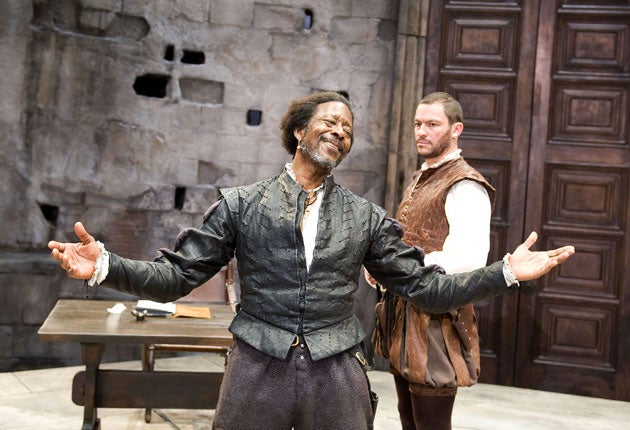First Night: Othello, Crucible Theatre, Sheffield
From Baltimore to the Bard: Wire stars make for arresting drama

Daniel Evans has pulled off a genuine casting coup for his production of Othello – a staging that forms the centrepiece of the Crucible Theatre's 40th birthday celebrations.
And he's done so without the least suspicion of gimmickry. It may be quite a schlep from the mean streets of Baltimore, where they played fellow detectives on the cult TV series The Wire, to the Venice and Cyprus of Shakespeare's tragedy, in which they play the Moor and his machiavellian ensign, Iago. But both Clarke Peters and Dominic West are seasoned stage performers and, unlike many recent pairs who have traced the warped and ruinous intimacy that develops between these two characters, they seem to punch at the same weight, theatrically speaking.
If Evan's urgent, lucid production isn't the most searching or detailed account of the play ever seen, it does go some way to presenting this tragedy as a contest in which, for once, the bull and the matador are matched fairly evenly.
We are uncomfortable these days with the idea of nobility, so the trend for relocating a play in a latter-day British colonial outpost inherently diminishes our estimation of the hero's grandeur, as does the habit of giving the title role to over-youthful musclemen. Evans counters this by placing the drama firmly in the mid-sixteenth century.
In Morgan Large's striking design, it unfolds fluently on the thrust stage which has become an octagonal, geometrically tiled piazza, with the characters emerging through the double doors of a monumental city wall.
At 59, Clarke Peters has the right stature and seniority for Othello, whose age (his fear of being "declined into a vale of years") is another of the insecurities upon which, along with colour and culture, Iago can play.
Peters' performance exudes gravitas, largeness of soul and a sadness that suggests his deluded sense of betrayal arises less from a quickness to jealousy than from a deep, sorrowful pessimism about his strictly conditional acceptance (as general only) in Venetian society.
Putting an African accent on Othello's lines, the actor is, however, too inclined to rush the verse and muffle its pulse, thus blunting the impression that the hero's grandiloquence is a rhetorical self-image he has needed to create as a defence against prejudice.
Dominic West breaks the recent mould of anally repressed NCO martinets with an ebullient, strapping brute of an Iago whom you could imagine (as ensigns did) leading the charge into battle. With his forthright approach and strong Sheffield tones, he's like a deadpan whirlwind parody of the plain-speaking Yorkshireman (you can see how he got his reputation for honesty). The actor's achievement is to marry this manner to the chillingly hypnotic, manipulative power and psychopathic emotional dissociation we saw in his recent brilliant portrayal of serial killer Fred West in the TV play Appropriate Adult.
There are moments here that freeze the soul, as when he suddenly advises Othello not to poison Desdemona, but to strangle her in her wedding sheets, as though it were just a helpful piece of advice about an impersonal problem of logistics.
Lily James is a piercingly young and beautiful heroine who retains, throughout her ordeal, traces of spark and mettle that led her to defy convention in the first place. She is partnered beautifully by Alexandra Gilbreath, whose Emilia has clearly been starved of every kind of affection in her marriage to Iago.
There have been accounts that have dug deeper into the idea that the villain's destructiveness is the reflex of jilted love for the Moor, but this direct and engrossing production (the first time this tragedy has been programmed here) is nonetheless a mighty fine way to celebrate the Crucible's 40th anniversary.
Join our commenting forum
Join thought-provoking conversations, follow other Independent readers and see their replies
Comments
Bookmark popover
Removed from bookmarks